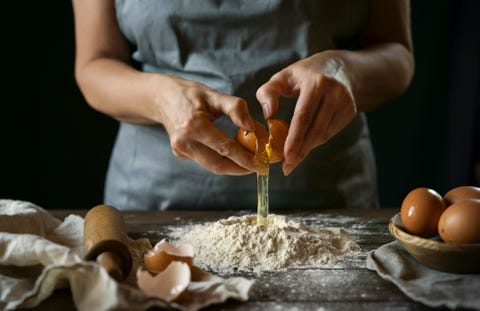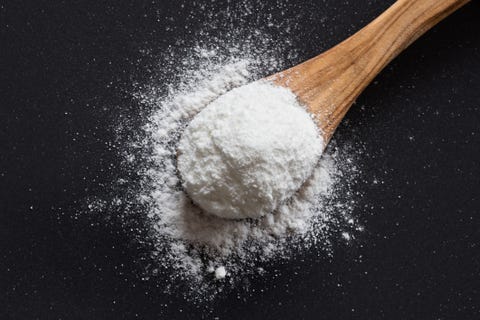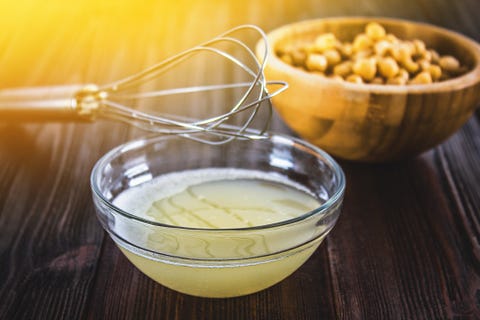Baking Over Easy Eggs in the Oven
No eggs? No problem. Whether you've run out of them, can't find them in the shops – or have an egg allergy – here's our expert guide to baking without eggs.
Why do we add eggs in baking?
To know how to effectively substitute ingredients for eggs, you need to know what they do when you add them to your cake batters and biscuit doughs.
Eggs serve two purposes in baked goods:
- Their air-trapping fluffiness when cooked helps to create a rise, making textures lighter in cakes and batters.
- The protein they contain adds a binding structure and stability, helping to keep sponges and biscuits from falling to pieces.
This is why too much egg in baking = rubbery/hard results.
What can I use instead of eggs when baking?
Between the history of food scarcity during wartime and then the huge increase in free-from and vegan baking in the modern world, a number of ingenious methods have been created to replicate what an egg does.
We wouldn't recommend using the following ideas in egg-heavy recipes, but if you need to replace one or two, the following alternative techniques can be brilliant...
This content is imported from {embed-name}. You may be able to find the same content in another format, or you may be able to find more information, at their web site.
Water
If the cupboard is truly bare, then water can actually work wonders to replace an egg in a cake. You won't get quite the same structure or lift, but it plays its part in adding a liquid component to a recipe and activating any raising agents.
For more flavour, coffee, tea or orange juice (more on these in the next point below), can also be used. It's hard to give a guide to how much water per egg, as it will vary depending on the recipe and what other liquids are added, but 50ml liquid is roughly equivalent to a medium egg and 75ml for large eggs.
Acids and bicarbonate of soda
Remember the childhood science experiment of mixing vinegar and baking soda together? Oodles of foamy bubbles are created instantly when they react. This combo works particularly well in a cake batter to help leaven and lighten it instead of eggs.
You may worry that you'll taste a sour flavour, or that the cake will pong, but fear not: The alkaline baking soda neutralises the acidity of the vinegar.
How much will vary from recipe to recipe, but 1/2tsp vinegar and 1/4 tsp bicarbonate of soda is an approximate ratio per egg. Our eggless Chocolate fudge cake recipe is proof it can be done.
Lemon juice and shots of strong coffee are also acidic, so function similarly too.
Flax and chia seed
Beloved in vegan recipes, a flaxseed or chia seed 'egg' is nothing more than 1tbsp ground flaxseeds or chia seeds beaten with 3tbsp water and left for 10-15min until thick and gelatinous. You can then use it in place of an egg in your baking. Great for cakes, pancakes and biscuits or where you need an egg to bind.
Cream cheese
With its mix of protein, fat and water, cream cheese also can be subbed in for an egg where binding is required.
Use 1-1.5 tablespoons in place of each egg, if you're replacing a medium or large egg, respectively. Try it in a classic chocolate chip cookie recipe and be amazed.
Plant milks
Plant milks do their duty in vegan recipes, replacing eggs to make pillowy-soft sponges. Case in point: this unbelievably excellent Lemon Drizzle Cake.
Aquafaba (chickpea water)
It's nothing short of miraculous that the viscous water from a tin of chickpeas (or the cooking liquid if you've boiled them yourself) whisks up like an egg white would. This is thanks to the liquid having a similar protein-rich composition, which behaves similarly to eggwhite when beaten.
You can make meringues, mayonaisse or a delightfully light chocolate mousse using this technique.
You can also use a couple of tablespoons of the chickpea water to replace an egg in cakes and or as a binder in biscuit and cookie doughs.
Apple sauce
For us Brits, apple sauce is a condiment for roast pork, but in the US, it's often used in baking, and can swap-in for eggs.
Apples contain lots of gelatinous pectin, which will bind and give structure in a cake or muffin. If you're wondering how much to use, 60g is roughly the amount you need per egg. If you've got a jar left over from a Sunday lunch, give it a go!
Bananas
Mashed banana can stand-in for egg in cakes, brownies, muffins and pancakes.
One medium banana is equivalent to one egg, but bear in mind it has a strong flavour, so only use it when it pairs well with the other ingredients in the recipe.
Xantham gum
A fine powder that mimics the chew and binding capabilities of gluten in gluten-free baking, xantham gum can also doubles as an egg replacer.
You only need 1/4tsp of xantham gum whipped into 4tbsp water per egg required. Find it near the baking powder or in the free-from section in shops.
Try vegan baking recipes
Ultimately, if you're after an egg-free recipe, searching for vegan desserts will help. We've put together our best vegan bakes and treats here.
Like this article? Sign up to our newsletter to get more articles like this delivered straight to your inbox.
SIGN UP
In need of some positivity or not able to make it to the shops? Enjoy Good Housekeeping delivered directly to your door every month! Subscribe to Good Housekeeping magazine and get 6 issues for just £6.
SUBSCRIBE HERE
This content is created and maintained by a third party, and imported onto this page to help users provide their email addresses. You may be able to find more information about this and similar content at piano.io
Source: https://www.goodhousekeeping.com/uk/food/a31974540/egg-free-baking/




0 Response to "Baking Over Easy Eggs in the Oven"
Postar um comentário